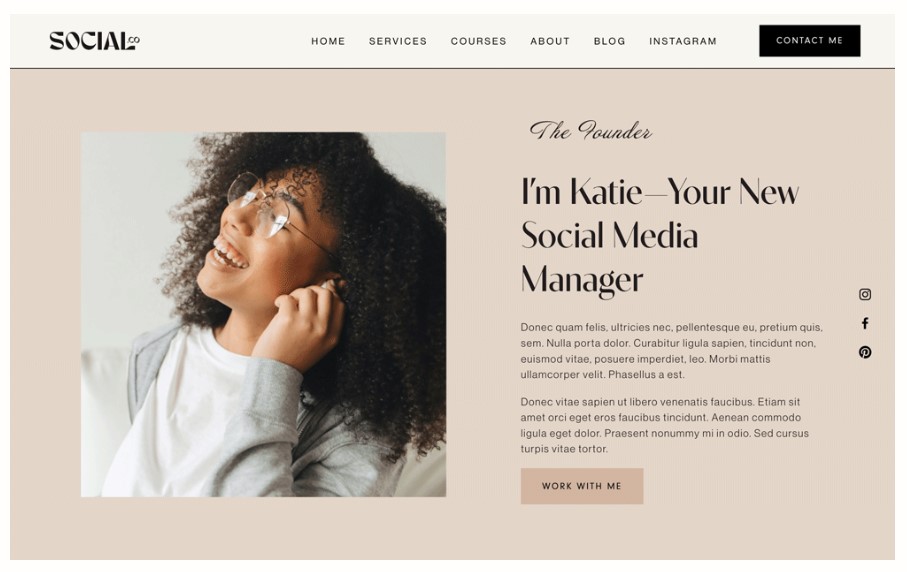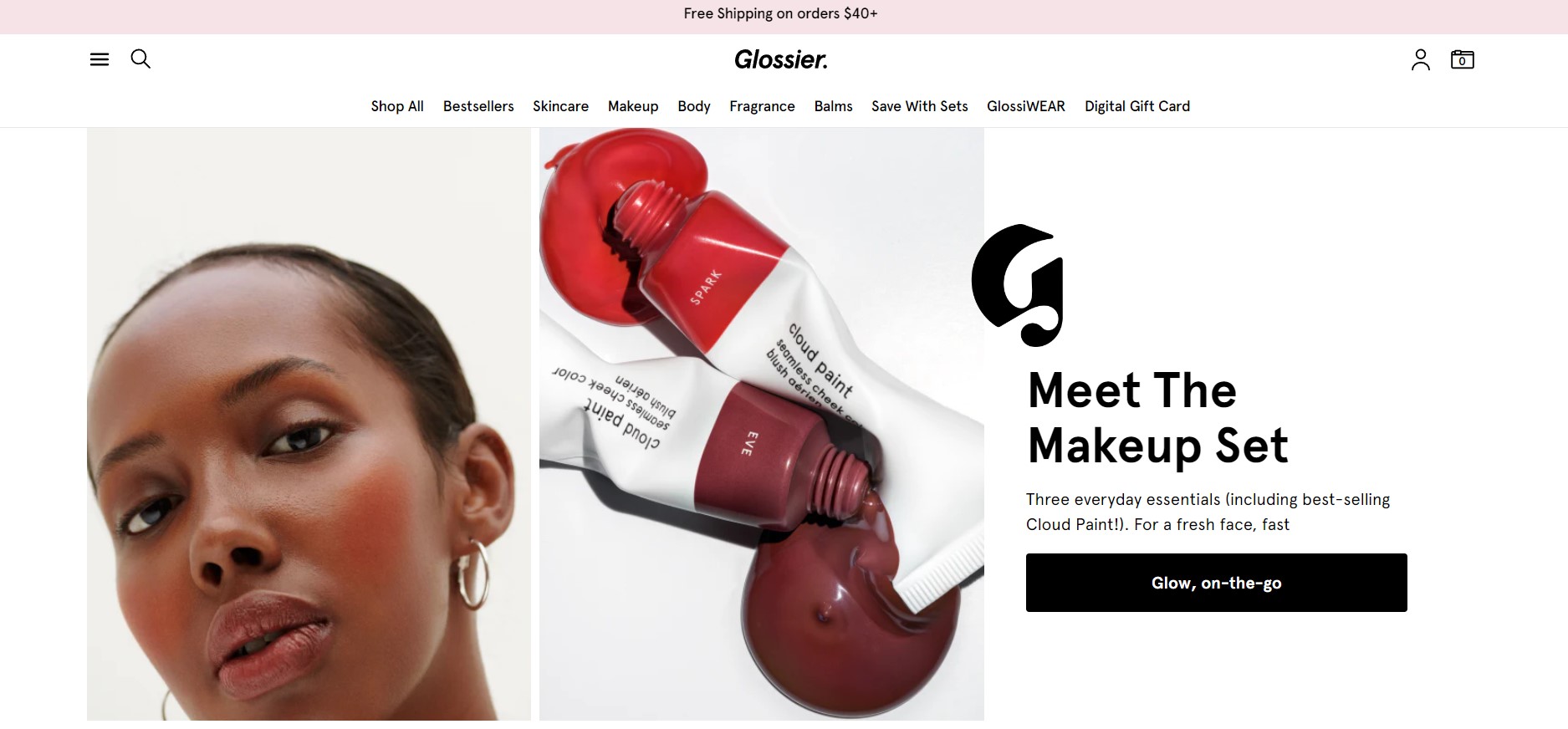How To Define Your Brand Personality?
Your brand personality is what sets it apart from the rest. It’s the unique blend of characteristics, values, and traits that make up the way people perceive your brand.

Defining your brand’s personality is essential to creating a strong, cohesive identity that resonates with your audience.
Many businesses make the mistake of assuming that their brand personality will simply emerge over time, without any deliberate effort. However, to build a truly successful brand, you need to be intentional about shaping how people perceive you.
In this blog post, we’ll take a closer look at the importance of defining your brand’s personality and walk you through the steps you can take to create a clear, cohesive identity that resonates with your target audience. We’ll explore how to identify your brand’s core values, how to communicate those values through your messaging, and how to ensure consistency across all your marketing channels. With these tips in hand, you’ll be well on your way to creating a brand personality that truly sets you apart.

What is brand personality?
Brand personality refers to the set of human characteristics and traits associated with a brand. It is the unique way that a brand communicates with its audience and the emotional connections it establishes with its customers.
A brand’s personality is the sum of its values, beliefs, and behaviors that make it distinct from other brands in the market.
A brand personality can be defined by its tone of voice, messaging, visual identity, and even its interactions with customers. It helps to create a sense of familiarity and relatability, allowing customers to form a bond with the brand beyond just the products or services it offers. This emotional connection can be a significant factor in a customer’s decision to choose one brand over another.
Creating a distinct brand personality is essential for building brand loyalty and recognition. It can also help to differentiate a brand in a crowded market, creating a unique identity that stands out to customers. Companies often invest significant resources into developing and maintaining their brand personalities, as it can be a critical factor in the success of their overall brand strategy.
A brand personality is a unique set of characteristics, values, and behaviors that define a brand and create emotional connections with customers.
How To Define Your Brand’s Personality?
Defining your brand’s personality is essential to establish a strong and consistent brand identity.
It helps you communicate with your target audience in a way that resonates with them and differentiates you from competitors. So, how do you define your brand’s personality?
- Define your brand values: Start by determining your brand’s core values. What are the beliefs and principles that guide your brand’s actions? This will help you understand what your brand stands for and how it should be perceived.
- Identify your target audience: Understanding your target audience is crucial in defining your brand’s personality. Conduct market research to identify their demographics, psychographics, and preferences.
- Choose personality traits: Based on your brand values and target audience, select personality traits that align with your brand. For instance, if you’re a luxury brand, you might choose traits like sophisticated, elegant, and refined.
- Develop a brand voice: Your brand’s personality should be reflected in your brand voice. Develop guidelines for your brand’s tone of voice, including language, vocabulary, and communication style.
- Consistency is key: Consistency is crucial in establishing a strong and memorable brand personality. Ensure that your brand’s personality is reflected consistently across all brand touchpoints, including your website, social media, and marketing materials.
In summary, defining your brand’s personality is crucial in establishing a strong and consistent brand identity. By determining your brand values, understanding your target audience, choosing personality traits, developing a brand voice, and ensuring consistency, you can establish a unique and authentic brand personality that resonates with your audience.

What are the benefits of having a strong brand personality?
Having a strong brand personality can offer several benefits for a business.
It can help create a unique identity that sets it apart from competitors and makes it easier for consumers to recognize and remember. A strong brand personality can also foster a connection with the target audience by creating an emotional attachment or appeal. By aligning the brand personality with the values and needs of the target audience, a business can build trust and loyalty.
Furthermore, a strong brand personality can also help with brand consistency and messaging across different marketing channels.
It guides the creation of content and messaging that is in line with the brand’s identity and values. This consistency can help build trust and recognition over time, as consumers come to associate certain traits and values with the brand.
Finally, a strong brand personality can also help with attracting and retaining employees.
A clearly defined brand personality creates a sense of purpose and identity that employees can align with and feel proud to represent. This can lead to higher job satisfaction and engagement, as well as better retention rates.
How to identify brand’s core values?
Defining your brand’s core values is essential in establishing a strong and consistent brand personality.
These values are the fundamental beliefs and principles that guide your brand’s actions and decision-making processes, both internally and externally. They are the pillars that hold your brand together and define its character.
Identifying your brand’s core values involves looking deeply into your brand’s purpose, mission, and vision. Ask yourself what your brand stands for, what it represents, and what it aims to achieve. Your core values should reflect your brand’s personality and should be communicated consistently across all touchpoints.
When defining your brand’s core values, consider qualities such as authenticity, honesty, transparency, respect, and innovation. These values should align with your brand’s purpose and resonate with your target audience.
It’s essential to involve your team in defining your brand’s core values to ensure that everyone is on the same page and that your values are reflected in your brand’s culture and operations. Once you have identified your core values, it’s crucial to communicate them effectively to your team, stakeholders, and customers.
Incorporating your brand’s core values into your messaging, visuals, and interactions with customers can help establish trust and build brand loyalty. When customers see that your brand’s actions align with its values, they are more likely to develop an emotional connection with your brand and become loyal advocates.
Identifying and incorporating your brand’s core values into your brand personality is crucial in establishing a strong and consistent brand identity.
Your core values should align with your brand’s purpose, resonate with your target audience, and guide your brand’s actions and decision-making processes.

Can a brand personality change over time?
Yes, a brand personality can change over time.
As businesses grow and evolve, their brand personalities may need to shift in order to remain relevant and resonant with their target audiences. External factors, such as changes in consumer behavior, market trends, and competitive pressures, can also influence a brand’s personality.
For example, a brand that was initially known for its youthful and trendy image may need to evolve its personality to appeal to an older demographic as its customer base ages. Alternatively, a brand may need to adopt a more socially responsible or environmentally conscious personality in response to growing concerns about sustainability.
It’s important to note that while a brand’s personality can evolve, it should still remain authentic to the core values and mission of the business. Sudden or drastic changes to a brand’s personality can be confusing and disorienting to customers, leading to a loss of trust and loyalty.
Therefore, any changes to a brand’s personality should be carefully considered and executed in a thoughtful and strategic manner.
The characteristics of a successful brand personality
A successful brand personality is one that resonates with its target audience and reflects the values and qualities that the brand wants to be known for. Here are some of the key characteristics of a successful brand personality:
Consistency
Consistency involves maintaining a uniform voice, tone, and behavior across all communication channels and touchpoints.
A consistent brand personality ensures that customers receive a cohesive brand experience and fosters trust and reliability. It helps to create a distinct and recognizable identity that sets the brand apart from competitors.
Additionally, consistency in brand personality helps to build brand loyalty and advocacy. When customers are consistently satisfied with their interactions with a brand, they are more likely to become repeat customers and recommend the brand to others.
Therefore, it is crucial to ensure that all employees and stakeholders understand the brand personality and are aligned in their efforts to maintain consistency in all brand-related activities.
Authenticity
Authenticity is an essential aspect of a successful brand personality.
It is the quality that makes a brand real and relatable to its target audience. An authentic brand personality shows that the company is honest and transparent in its communications and actions. Customers can trust the brand because it doesn’t pretend to be something it’s not.
To create an authentic brand personality, companies must define their values and beliefs and incorporate them into all aspects of their branding. This includes messaging, visual identity, and customer experience. Brands that communicate with authenticity can build long-lasting relationships with their customers based on trust and mutual understanding. In contrast, brands that lack authenticity can quickly lose customers who feel misled or deceived.
Authenticity also means admitting mistakes and taking responsibility for them. When a brand acknowledges its missteps and takes steps to correct them, it shows its commitment to transparency and customer satisfaction.
This openness can strengthen a brand’s relationship with its customers and build a more loyal following.
Differentiation
Differentiation in brand personality refers to the uniqueness and distinctiveness of a brand in the market.
It is crucial for a brand to have a clear differentiation strategy to stand out from its competitors and make a lasting impression on its target audience. A unique brand personality allows the brand to differentiate itself from competitors, which can lead to increased customer loyalty and retention.
To establish a differentiated brand personality, brands must first identify their unique value proposition and determine what sets them apart from their competition. This could be a unique product offering, exceptional customer service, or a distinctive brand voice. Once the differentiation strategy is established, it should be integrated into all aspects of the brand, including marketing materials, communication channels, and customer interactions.
By maintaining a consistent and authentic brand personality that is different from its competitors, a brand can establish a unique position in the market and attract customers who resonate with its values and messaging.
This will ultimately lead to increased brand recognition, loyalty, and success.
Emotional Connection
Emotional connection is a crucial aspect of a successful brand personality.
It is the bond between the brand and its target audience that creates a deep, lasting relationship. Brands that focus on creating an emotional connection with their customers can tap into their desires, needs, and aspirations, and establish trust and loyalty.
To achieve emotional connection, brands need to understand their target audience’s emotions and create a personality that resonates with them. They can achieve this through storytelling, visuals, and messaging that evoke feelings of happiness, excitement, comfort, or any other emotion that aligns with their brand.
An emotional connection helps brands stand out in a crowded marketplace, fostering customer loyalty and advocacy.
Customers that connect with a brand on an emotional level are more likely to become long-term customers and recommend the brand to others.
In conclusion, building an emotional connection with customers is a critical aspect of a successful brand personality. Brands should strive to understand their customers’ emotions and create a personality that resonates with them to establish a deep and lasting relationship.
Flexibility
While consistency is important, a brand’s personality should also have the ability to adapt and evolve over time.
This is because consumer trends and preferences are constantly changing, and a brand’s personality needs to remain relevant to its target audience.
A flexible brand personality allows for experimentation and innovation, which can help a brand stand out in a crowded marketplace. It also allows a brand to respond to unexpected events or shifts in the industry without compromising its overall identity.
At the same time, a brand’s personality should maintain a core set of values and characteristics that are consistent across all communications. This ensures that consumers can recognize and trust the brand, even as it evolves over time.
By striking a balance between consistency and flexibility, a brand can create a personality that is both authentic and adaptable, helping it to build long-lasting relationships with its audience.
Memorability
In today’s competitive market, brands need to have a unique personality to stand out and be memorable to their target audience.
A memorable brand personality makes it easier for customers to connect with the brand and remember it over time. By creating a consistent and distinctive brand personality, companies can ensure that their message is clear and that customers can quickly recognize them among their competitors.
Memorability in brand personality is about creating a lasting impression on the customer’s mind. Brands can achieve this by using unique colors, slogans, or jingles that resonate with their audience. The key is to be consistent in using these elements across all channels to reinforce the brand’s identity and increase its recognition.
A memorable brand personality also builds brand loyalty and can increase customer retention. Customers are more likely to remember and recommend a brand with a strong and memorable personality, which can lead to increased sales and profitability.
Therefore, it is essential for brands to invest in developing a distinctive and memorable personality that resonates with their target audience.
This is how you communicate your brand personality to your target audience
To effectively communicate your brand personality to your target audience, you need to create a consistent brand image across all communication channels.
Here are some ways to do this:
- Use the right tone of voice: Use language that reflects your brand personality in all your marketing communication, such as website copy, social media posts, and advertising. How To Develop Your Brand’s Tone Of Voice
- Visual Identity: Use visual elements that reflect your brand personality, such as colors, fonts, imagery, and design elements, across all channels. What Is Visual Branding And How It Can Help Your Business
- Content Strategy: Develop a content strategy that reflects your brand personality, such as the type of content you create and the tone of voice you use.
- Customer Service: Ensure that all customer service interactions reflect your brand personality, such as how you respond to customer queries and complaints.
- Brand Storytelling: Use storytelling techniques to communicate your brand personality through your brand’s origin story and your brand’s values. Become A Visual Storyteller: Use Images to Tell Your Brand’s Story
By consistently communicating your brand personality across all channels, you can establish a strong and memorable brand image in the minds of your target audience.
Create a consistent brand personality across all touchpoints
Creating a consistent brand personality across all touchpoints is crucial to ensure that your brand is recognizable and memorable.
The first step in creating a consistent brand personality is to define your brand’s personality traits and values. Once you have a clear understanding of your brand personality, you should create a brand style guide that outlines the key visual and written elements of your brand, such as typography, color palette, tone of voice, and messaging.
To ensure consistency, all marketing materials, from social media posts to packaging, should align with the brand style guide.
This includes ensuring that all visual and written elements are consistent in style and tone, and that the brand’s core messaging is communicated consistently across all touchpoints.
It is also important to train all employees who interact with customers on the brand personality and ensure they understand how to communicate it effectively. Finally, regularly reviewing and updating your brand style guide and marketing materials can help ensure consistency and keep your brand personality relevant and fresh.
- Define your brand personality: Start by defining your brand personality, including its values, traits, and characteristics. Use this information to create a brand style guide that outlines how your brand should look, feel, and sound.
- Create a brand voice: Develop a brand voice that matches your brand personality. This includes the tone, language, and messaging that your brand uses to communicate with your audience.
- Ensure consistency in design: Make sure your visual branding elements, including your logo, typography, color scheme, and imagery, are consistent across all touchpoints. This helps create a cohesive look and feel that reinforces your brand personality.
- Train employees: Ensure that all employees are trained on your brand personality and understand how to communicate it effectively across all touchpoints. This includes training on messaging, tone of voice, and visual branding.
- Conduct regular brand audits: Conduct regular brand audits to ensure that your brand personality is consistent across all touchpoints. This includes reviewing your website, social media, advertising, and other marketing materials to ensure that they all reflect your brand personality.
Differentiate your brand personality from competitors
To differentiate your brand personality from your competitors, you need to identify your unique selling proposition (USP) and brand values.
Here are some steps you can take:
- Identify your target audience: Understanding your target audience’s needs and preferences is key to developing a unique brand personality.
- Conduct a competitive analysis: Analyze your competitors’ brand personalities and identify gaps in the market that you can fill.
- Develop a unique selling proposition: Determine what sets your brand apart from the competition and highlight it in your messaging and branding.
- Define your brand values: Determine what your brand stands for and communicate it consistently across all touchpoints.
- Be authentic: Your brand personality should reflect your company’s values and be genuine to avoid coming across as insincere or fake.
- Stay up to date with trends and innovate your products, services, and messaging to keep your brand fresh and exciting.
By following these steps, you can create a brand personality that stands out from your competitors and resonates with your target audience. Remember to communicate your brand personality consistently across all touchpoints to build a strong and recognizable brand.
How important is brand personality in building brand loyalty?
Brand personality is a critical element in building brand loyalty.
In today’s competitive market, where consumers are bombarded with numerous brand messages, creating a unique brand personality helps to distinguish a brand from its competitors. A brand with a strong personality that resonates with its target audience creates a connection that goes beyond the product or service being offered.
When consumers identify with a brand personality, they tend to form an emotional connection with the brand, making it more likely that they will remain loyal to the brand over time. A consistent brand personality that is communicated effectively across all touchpoints reinforces the brand’s values and creates a sense of trust with consumers. As a result, consumers are more likely to become repeat customers and advocates of the brand.
In summary, a strong brand personality is a key driver of brand loyalty. It helps to differentiate a brand from its competitors and creates an emotional connection with consumers.
By consistently communicating its brand personality across all touchpoints, a brand can build a loyal customer base that will support the brand over the long term.
Can a brand personality be influenced by cultural factors?
Yes, cultural factors can have a significant influence on a brand’s personality.
The cultural values and beliefs of a target audience can shape the way they perceive a brand, and therefore, the personality that the brand conveys.
For example, in some cultures, the concept of “individualism” is highly valued, and brands that emphasize personal achievement and self-expression may resonate better with consumers in those cultures. In contrast, cultures that value collectivism and community may respond better to brands that emphasize collaboration and social responsibility.
Similarly, cultural differences in communication styles and humor can impact the tone and language that a brand uses to communicate its personality. Brands that fail to recognize and adapt to these cultural nuances risk coming across as tone-deaf or even offensive to their target audience.
Therefore, it’s important for brands to consider the cultural context of their target audience when developing and communicating their brand personality. This can involve conducting market research to understand cultural values and preferences, as well as working with local experts or partners to ensure that messaging and communication styles are appropriate and effective in a specific cultural context.
Interesting examples of brand personality
Here are a few examples of brands with interesting and unique personalities:
Dollar Shave Club: This brand has made a name for itself by being irreverent, humorous, and a little bit edgy. Their marketing campaigns are known for their clever, tongue-in-cheek messaging, which has helped them stand out in a crowded market.

Patagonia: This outdoor clothing company has built a brand personality around environmentalism and sustainability. They are known for their commitment to ethical business practices and for using their brand to promote conservation and activism.

Glossier: Glossier has created a brand personality that feels approachable, youthful, and fun. Their minimalistic packaging and emphasis on natural beauty have helped them connect with a younger, socially conscious audience.

Slack: This workplace communication platform has a brand personality that is both professional and playful. They use humor and quirky design elements to make their software more engaging and user-friendly.

Coca-Cola: Coca-Cola’s brand personality is characterized by happiness, joy, and togetherness. The company’s advertisements often feature people coming together to share a Coke, which has helped to create a sense of community around the brand.

Tesla: Tesla’s brand personality is characterized by innovation, sustainability, and luxury. The company’s electric vehicles are designed to be environmentally friendly, while also offering high-end features and design.

Each of these brands has a unique personality that helps them stand out from the competition and connect with their target audience. By defining their core values and creating a consistent brand voice and messaging, they have been able to build strong, loyal followings.
Conclusion
In conclusion, defining and establishing a strong brand personality is essential for businesses that seek to connect with their target audience and build long-term brand loyalty.
A clear brand personality helps to differentiate a business from its competitors, create emotional connections with consumers, and foster a consistent brand experience across all touchpoints.
To define your brand personality, it’s important to start by understanding your target audience and how they perceive your brand. From there, you can identify the key characteristics and values that you want your brand to embody and develop a messaging strategy and visual identity that supports your brand personality.
Maintaining consistency in your brand personality across all touchpoints, including marketing materials, social media channels, and customer interactions, is crucial to building a strong brand identity and establishing trust with your audience.
Finally, it’s important to remember that a brand personality is not set in stone and can evolve over time. By staying attuned to your audience’s needs and preferences and staying flexible in your approach, you can ensure that your brand personality remains relevant and resonant with your target audience.
Overall, by investing time and resources in defining and developing a strong brand personality, businesses can create a powerful and enduring connection with their customers, ultimately leading to increased brand loyalty and business success.
Learn more about branding here:
Brand Strategy – What Is it?
How To Make A Mood Board
Brand Anatomy – What Is It And What Are It’s Key Elements?
How To Develop Your Brand’s Tone Of Voice
Last Updated on 26/04/2025 by Victoria Silber





